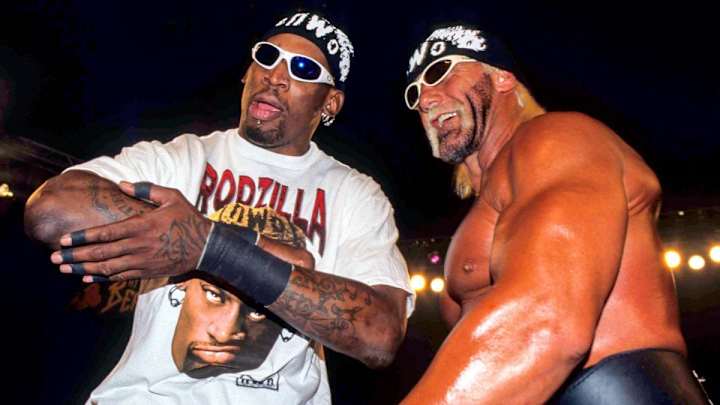Dennis Rodman Once Skipped Practice During NBA Finals to Appear in WCW

The one thing people can’t stop talking about after Sunday’s airing of The Last Dance on ESPN is how Dennis Rodman, in the middle of the 1997–98 season, told the Bulls he needed some time to blow off steam and went to party in Las Vegas.
It wasn’t the last time Rodman would ditch the team that year.
The ESPN documentary focuses on a Bulls dynasty on the brink of a massive breakup. Michael Jordan was on the verge of retirement, Scottie Pippen and Phil Jackson would both be gone after the season and the team—and it is fair to say the league as a whole—was growing tired of Rodman.
Rodman is possibly the greatest rebounder in the history of basketball, but, incredibly, he is better known for his antics off the court than he is for his Hall of Fame play on it. The third one-hour installment of The Last Dance focused on the eccentric Rodman, who was making appearances in WCW during the season.
His first wrestling appearance came on March 10, 1997, when he aligned himself with Hollywood Hulk Hogan and he would go on to make periodic appearances for the company, mostly in the offseason.
But when the build to the July 1998 Bash at the Beach pay-per-view overlapped with the Bulls’ trip to the NBA Finals, Rodman missed a Bulls practice to appear for WCW. Following Game 3—a 42-point Chicago win over the Jazz—Rodman flew from Chicago to Detroit to appear live on Nitro at the Palace of Auburn Hills, his former home as a member of the Pistons, where he and Hogan attacked Diamond Dallas Page.
Steve Kerr, who played a key part on that Bulls team and is now the head coach of the Warriors, recalled Rodman missing practice.
“There wasn’t anything that was really that surprising, at that point, with Dennis,” Kerr says. “We sort of understood he was his own man. He did so much for the team, but to do it during the Finals, that was another indication this was all coming to an end.
“There was just a lifespan on that team that wouldn’t allow us to go on any further, even if players were still under contract. We all felt like, ‘This was it.’ And we were fortunate to win that last championship, because there were many difficult times along the way.”
Still, Kerr says, the team harbored no ill will toward Rodman for ditching practice.
“The beauty of Dennis joining the Bulls [when he did] was we had a really mature team,” Kerr says. “There were a lot of veteran players, and Phil had a beautiful connection with Dennis, and so did his teammates. That gave Dennis the freedom and the space he needed. It wasn’t a thing where we were all complaining about Dennis not making it to a practice. We just sort of understand he was his own man, and he did so much for our team that it allowed him that freedom.”
Fortunately for Rodman, he had a practice on Tuesday and shootaround before the series’ fourth game that Wednesday, which the Bulls won to take a commanding lead in the series, three games to one. Rodman, who was coming off the bench, played just over 29 minutes and grabbed 14 rebounds.
“That put the coach in a terribly difficult position,” said Kerr. “That was part of Phil’s genius—understanding how to maintain authority, and the team’s momentum, in the face of adversity. Whether it was something brought on that was unforeseen, or a player missing practice during the Finals, he found the right tone and the right message.”
